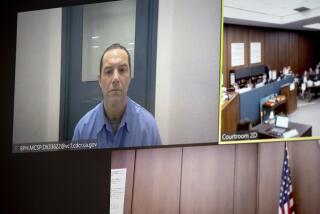San Diego
- Share via
Attorneys for a former California Highway Patrol officer charged with murdering a San Diego State University student while on duty dropped objections Tuesday to certain methods of analyzing blood stains on the victim’s clothing.
Superior Court Judge Richard Huffman subsequently ruled the tests are admissible evidence during a pretrial hearing for Craig Peyer, 37, of Poway. The hearing then was recessed until Dec. 14, when Gary Harmor, the technician who performed the blood tests, can testify.
Authorities contend Peyer strangled Cara Knott, 20, on Dec. 27 while patrolling Interstate 15 south of Escondido, then threw her body off a nearby 75-foot-high bridge. His trial is scheduled for Jan. 4.
Prosecutors believe they can link Peyer to the killing through a seldom-used method of analyzing blood stains found on the victim’s sweat shirt and boot.
The defense continues to challenge the validity of some of those tests, which identify genetically determined protein components in a person’s blood called “genetic markers.” As more genetic markers from the stains on Knott’s clothes are allowed into evidence, prosecutors can reduce the number of people the stains could have come from.
One of Peyer’s genetic markers, revealed by a test Huffman hasn’t yet ruled on, is shared by only 2% of the population, Deputy Dist. Atty. James Atkins said outside court.
If all tests of blood stains from Knott’s clothing are allowed into evidence, the resulting combination of genetic markers would be found in less than 1% of the population, Atkins said.
The procedure isn’t used very often in the United States because it’s very expensive and requires special equipment not found in most of the nation’s forensic crime labs.
Huffman still is considering whether a Georgia doctor who is an expert in genetic marker testing needs to testify about its validity before the judge will rule on the admissibility of the remaining blood samples.
Dr. Moses Schanfield of Atlanta may not have to testify if prosecutors and the defense can agree on which transcript of his previous testimony about genetic marker testing should be submitted to Huffman.
Defense attorneys have objected to having Schanfield testify before the trial because they have retained him as their expert blood analysis witness.
Huffman has said he will rule on all blood analysis motions before considering a defense request not to allow testimony from other female motorists whom Peyer allegedly stopped under unusual circumstances in the months before Knott was killed.
More to Read
Sign up for Essential California
The most important California stories and recommendations in your inbox every morning.
You may occasionally receive promotional content from the Los Angeles Times.













